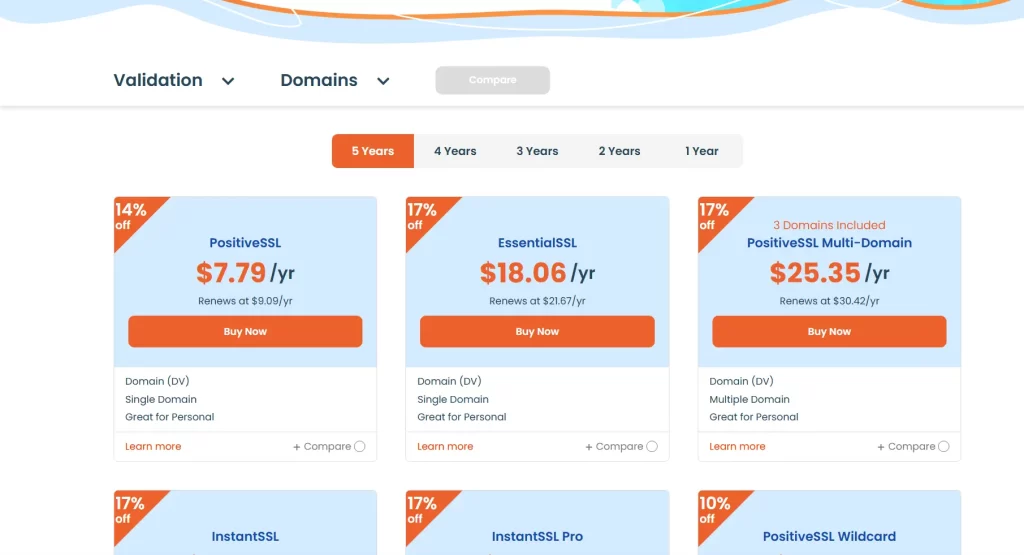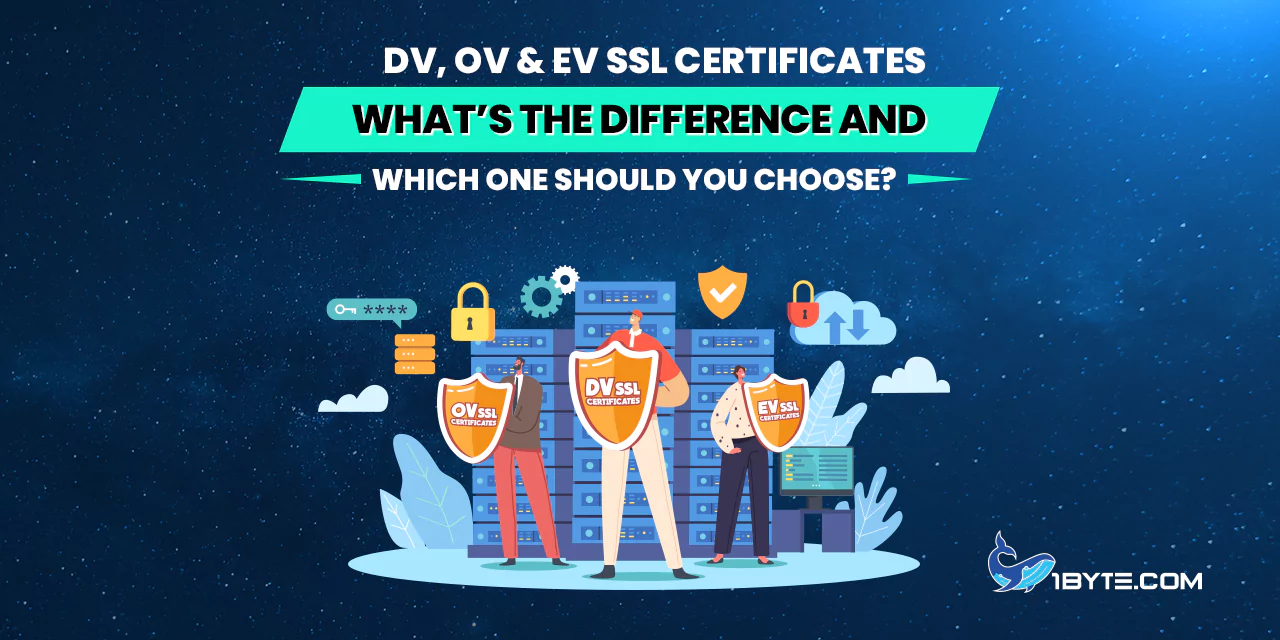SSL certificates come in three main types: Domain Validation (DV), Organization Validation (OV), and Extended Validation (EV). They all encrypt data between a website and its visitors. But they differ in how much identity they verify. For example, a DV certificate confirms only domain ownership, while an OV SSL certificate also checks the organization behind the site. An EV SSL certificate requires thorough legal vetting of the company.
By mid-2025, roughly 88% of websites use HTTPS. This shows how essential SSL has become for web security. Demand for SSL is high as users expect secure browsing. However, not all SSL certificates inspire the same level of trust. For example, a Q4 2024 report found about 989,000 phishing sites, many of which used valid SSL certificates to appear legitimate. This makes choosing the right SSL certificate crucial.
Domain Validation (DV) Certificates
A DV certificate validates only that the domain belongs to the requester. It is the quickest and simplest SSL to obtain. Domain owners can usually get a DV SSL certificate in minutes through automated email or DNS checks. It requires no business documents or identity verification.
Because DV validation is easy, these certificates are very low-cost or even free. Let’s Encrypt alone has issued over a billion free DV certificates and holds about 63.7% of the SSL market share. DV certificates dominate SSL issuance. One analysis finds that roughly 80% of all certificates are DV (Netcraft reports up to 94%). A DV SSL still provides full encryption (the browser shows a padlock). It is ideal for blogs, personal sites, portfolios, or any site that does not handle sensitive data.
DV certificates can secure one domain or multiple domains. A wildcard DV certificate (like *.example.com) covers all subdomains under one domain, but the CA still only validates control of the main domain name. Similarly, a single DV certificate can be issued for multiple sites using Subject Alternative Names (SAN). These options give flexibility for small businesses or blogs with several URLs. In all cases, a DV SSL encrypts traffic but only verifies domain ownership.
Organization Validation (OV) SSL Certificates
An OV SSL certificate verifies both the domain and the organization behind it. The Certificate Authority will check that the company is legally registered and that the requester has authority to represent it. This involves validating business documents, company address, and phone number. The OV validation process takes longer (often 1–3 days) and costs more than a DV certificate.
OV certificates add credibility to a site. When a user clicks the padlock, they can see the verified organization name in the certificate details. This extra verification helps build trust for businesses and e-commerce sites. About 15–18% of websites use OV certificates. These sites handle roughly 27% of web traffic, reflecting their use by medium and larger organizations. OV SSL certificates often include higher warranty amounts and optional dynamic site seals, further assuring visitors of the site’s authenticity.
Like DV, OV certificates can also cover multiple domains for one business. You can get an OV SSL with multiple SANs to secure several hostnames under the same validated organization. Some CAs even offer OV wildcard certificates, which cover subdomains once the company is validated. In each case, the SSL certificate will show the same organization details.
Extended Validation (EV) SSL Certificates
An EV SSL certificate provides the highest level of identity verification. It requires a rigorous vetting process: the organization must be officially registered and in good standing, and the requester’s authority must be confirmed. Because EV checks are so thorough, EV certificates can take days or even weeks to issue and have the highest price of all SSL types.
EV certificates were once identified by a green browser bar or company name. Modern browsers no longer highlight EV differently, but EV still embeds the verified organization details in the certificate. Industries that handle sensitive data (finance, government, healthcare) favor EV certificates to prevent phishing. In fact, one study found the incidence of phishing sites using EV was essentially zero, underlining EV’s effectiveness. EV adoption is very limited: only about 2–5% of sites use EV certificates. Netcraft reports EV usage at only ~0.1%. Many banks and large organizations still deploy EV to reassure customers of their identity. Qualified Web Authentication Certificates (a special EV type) are mandated for EU banking under PSD2 regulations.
EV certificates cannot be issued as wildcards or multi-domain. Each EV SSL is tied to one exact domain and entity. If a company needs EV for several domains, it must obtain separate EV certificates. Typically, EV is reserved for very high-profile domains where trust and regulatory compliance are crucial.
Key Differences Between DV, OV, and EV

- Validation Level: DV checks only domain ownership. OV checks the domain and organization identity. EV requires full legal identity verification.
- Issuance Time: A DV SSL certificate can be issued in minutes. An OV SSL usually takes 1–3 days. An EV SSL often takes the longest due to manual checks.
- Cost: DV certificates are the cheapest (often free). OV certificates cost more. EV certificates cost the most because of the intense validation process.
- Trust Signals: All show a padlock in the address bar. OV and EV certificates let users view verified organization details in the certificate. (In older browsers, EV would display the company name or a green address bar.)
- Usage: DV certificates suit blogs and personal or informational sites. OV certificates are common for business, e-commerce, and login portals. EV certificates are reserved for high-security sites like banks, large enterprises, and regulated sectors.
- Wildcard/Multi-domain: DV and OV certificates can be issued as wildcard or multi-domain (SAN) certificates. EV certificates cannot be wildcards or SANs – each EV SSL covers only one domain and organization.
- Warranty: DV SSL offers minimal or no warranty. OV and EV certificates include higher warranty levels to cover any encryption-related issues.
SSL Usage and Trends
DV certificates truly dominate the market. A 2024 analysis shows around 80% of SSL certificates are DV, with OV around 15–18% and EV only 2–5%. Let’s Encrypt’s mass issuance drives this trend. Meanwhile, HTTPS adoption is nearly universal: about 88% of websites now use SSL/TLS (up from under 20% in 2018). Google reports that over 95% of page loads on Chrome were over HTTPS by early 2025, meaning almost all major sites are secure.
In real terms, the Internet now has over 299 million SSL certificates detected (as of 2025). Many site owners use free DV certificates to secure their sites quickly. However, this ease has a downside: about 30% of sites use weak SSL configurations, and over 90% of phishing sites now use HTTPS (often with a DV certificate). The padlock alone no longer guarantees trust; visitors should verify the site’s identity or organization when security matters.
The industry is also shifting to shorter certificate lifespans. As of 2025, the CA/Browser Forum limits certificates to 1 year validity (with 6 months soon). This means more frequent renewals and emphasizes the need for automation. But it also ensures SSL protection is kept up-to-date.
Managing SSL Certificates
Managing certificate renewals and upgrades is important. Domain-validated certificates often support automated renewal via ACME protocols (for example, Let’s Encrypt or other DV services). This means a DV SSL can be issued and renewed by software without manual steps. OV and EV certificates usually require manual renewal and re-validation each time, because the CA must confirm the organization again. Many hosting providers (like 1Byte) offer managed SSL services to simplify this. We can automate DV SSL renewals and handle the OV/EV paperwork on your behalf, so you never have to worry about expiration.
Which SSL Certificate Should You Choose?
Choosing the right SSL certificate depends on the website’s purpose, budget, and trust requirements:
- Simple Sites & Blogs: A DV certificate is usually sufficient. It secures the connection quickly and at minimal cost. For example, a personal blog or portfolio can use a free DV SSL from Let’s Encrypt and still display the HTTPS padlock.
- Business & E-commerce: An OV SSL certificate is a good middle ground. It shows the organization’s verified name, which reassures customers on login or checkout pages. For instance, a small online store or company website might invest in OV SSL to confirm it is a licensed business.
- High-Security & Compliance: If your site handles sensitive transactions or falls under strict regulations, an EV SSL certificate provides maximum assurance. It is expensive, but some institutions (banks, large marketplaces) choose EV to stand out. Note: Modern browsers hide the green bar, but EV still embeds your verified identity.
- Budget & Time: If you need security immediately and have a tight budget, start with a DV SSL. If you have resources and want higher trust, plan for an OV (or eventually EV).
- Terminology: Remember, people often search for “DV certificate”, “DV SSL”, “OV SSL”, or even “SSL OV”. These all refer to the Domain Validation or Organization Validation certificate types. We’ve covered all these terms here for clarity.
To illustrate, consider a few examples. A personal blog (e.g. blog.example.com) might use a free DV certificate and simply show the padlock, which is enough for readers. A local business site (e.g. shop.example.com) might purchase an OV SSL to display its verified company name at login or checkout, boosting customer trust. A large bank or government portal would typically deploy an EV certificate to provide the highest assurance of identity (even though users now only see a padlock). In all cases, encryption is assured; the difference is in how much trust and assurance you communicate to visitors.
Leverage 1Byte’s strong cloud computing expertise to boost your business in a big way
1Byte provides complete domain registration services that include dedicated support staff, educated customer care, reasonable costs, as well as a domain price search tool.
Elevate your online security with 1Byte's SSL Service. Unparalleled protection, seamless integration, and peace of mind for your digital journey.
No matter the cloud server package you pick, you can rely on 1Byte for dependability, privacy, security, and a stress-free experience that is essential for successful businesses.
Choosing us as your shared hosting provider allows you to get excellent value for your money while enjoying the same level of quality and functionality as more expensive options.
Through highly flexible programs, 1Byte's cutting-edge cloud hosting gives great solutions to small and medium-sized businesses faster, more securely, and at reduced costs.
Stay ahead of the competition with 1Byte's innovative WordPress hosting services. Our feature-rich plans and unmatched reliability ensure your website stands out and delivers an unforgettable user experience.
As an official AWS Partner, one of our primary responsibilities is to assist businesses in modernizing their operations and make the most of their journeys to the cloud with AWS.
Conclusion

At 1Byte, as a leading cloud and hosting provider, we operate data centers internationally, ensuring fast, low-latency service for our customers everywhere. As an official AWS Partner, we help businesses modernize on the cloud and offer enterprise-grade solutions.
We provide complete web solutions: domain registration, VPS/cloud servers, hosting, and SSL certificates (DV, OV, EV) at competitive prices. For example, we offer some of the most affordable hosting and SSL bundles. We guarantee 99.99% uptime on our services and back it with 24/7 support. Our team is multilingual, so you get adequate help whenever you need it.
1Byte is ISO 9001 and 27001 certified, reflecting our commitment to quality and information security. We partner with top certificate authorities to simplify SSL management. In fact, one customer praises 1Byte for offering “the most affordable packages with powerful features like domain registration, SSL, and cloud servers”. Another notes that “1Byte’s hosting, SSL, and cloud server solutions have been exactly what I was looking for. They are easy to use and cost-effective”.
For our customers, adding an SSL certificate is straightforward. In our control panel, you can choose a DV, OV, or EV certificate and we handle the rest. 1Byte works with trusted CAs (like Let’s Encrypt for DV and DigiCert/Sectigo for OV/EV) to automate issuance and renewal. This way, your certificate is issued quickly and correctly without manual work.

